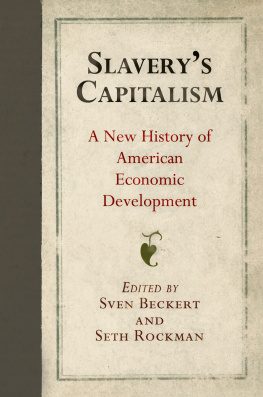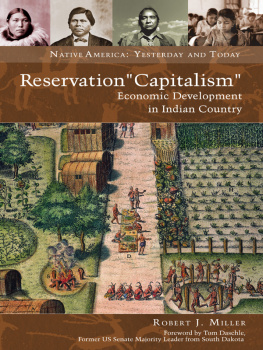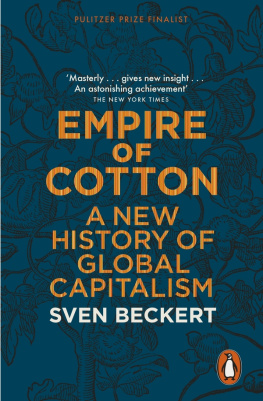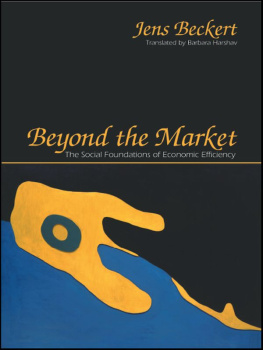Beckert Sven - Slaverys Capitalism: A New History of American Economic Development
Here you can read online Beckert Sven - Slaverys Capitalism: A New History of American Economic Development full text of the book (entire story) in english for free. Download pdf and epub, get meaning, cover and reviews about this ebook. year: 2016, publisher: University of Pennsylvania Press, Inc., genre: Politics. Description of the work, (preface) as well as reviews are available. Best literature library LitArk.com created for fans of good reading and offers a wide selection of genres:
Romance novel
Science fiction
Adventure
Detective
Science
History
Home and family
Prose
Art
Politics
Computer
Non-fiction
Religion
Business
Children
Humor
Choose a favorite category and find really read worthwhile books. Enjoy immersion in the world of imagination, feel the emotions of the characters or learn something new for yourself, make an fascinating discovery.
- Book:Slaverys Capitalism: A New History of American Economic Development
- Author:
- Publisher:University of Pennsylvania Press, Inc.
- Genre:
- Year:2016
- Rating:5 / 5
- Favourites:Add to favourites
- Your mark:
- 100
- 1
- 2
- 3
- 4
- 5
Slaverys Capitalism: A New History of American Economic Development: summary, description and annotation
We offer to read an annotation, description, summary or preface (depends on what the author of the book "Slaverys Capitalism: A New History of American Economic Development" wrote himself). If you haven't found the necessary information about the book — write in the comments, we will try to find it.
Slaverys Capitalism: A New History of American Economic Development — read online for free the complete book (whole text) full work
Below is the text of the book, divided by pages. System saving the place of the last page read, allows you to conveniently read the book "Slaverys Capitalism: A New History of American Economic Development" online for free, without having to search again every time where you left off. Put a bookmark, and you can go to the page where you finished reading at any time.
Font size:
Interval:
Bookmark:

Slaverys Capitalism
EARLY AMERICAN STUDIES
Series editors:
Daniel K. Richter, Kathleen M. Brown, Max Cavitch, and David Waldstreicher
Exploring neglected aspects of our colonial, revolutionary, and early national history and culture, Early American Studies reinterprets familiar themes and events in fresh ways. Interdisciplinary in character, and with a special emphasis on the period from about 1600 to 1850, the series is published in partnership with the McNeil Center for Early American Studies.
A complete list of books in the series is available from the publisher.
SLAVERYS CAPITALISM
A New History of American Economic Development
Edited by
Sven Beckert
and
Seth Rockman
PENN
UNIVERSITY OF PENNSYLVANIA PRESS
PHILADELPHIA
Copyright 2016 University of Pennsylvania Press
All rights reserved. Except for brief quotations used for purposes of review or scholarly citation, none of this book may be reproduced in any form by any means without written permission from the publisher.
Published by
University of Pennsylvania Press
Philadelphia, Pennsylvania 19104-4112
www.upenn.edu/pennpress
Printed in the United States of America on acid-free paper
10 9 8 7 6 5 4 3 2 1
A catalogue record for this book is available from the Library of Congress.
ISBN 978-0-8122-4841-8
To Ruth J. Simmons, President of Brown University, 20012012
CONTENTS

Sven Beckert and Seth Rockman
Edward E. Baptist
Caitlin Rosenthal
Daniel B. Rood
Bonnie Martin
Joshua D. Rothman
Daina Ramey Berry
Kathryn Boodry
Eric Kimball
Stephen Chambers
Calvin Schermerhorn
Craig Steven Wilder
Andrew Shankman
Alfred L. Brophy
John Majewski
Introduction
Slaverys Capitalism
SVEN BECKERT AND SETH ROCKMAN
During the eighty years between the American Revolution and the Civil War, slavery was indispensable to the economic development of the United States. Such a claim is at once self-evidently true and empirically obscure. A scholarly revolution over the past two decades, which brought mainstream historical accounts into line with long-standing positions in Africana and Black Studies, has recognized slavery as the foundational American institution, organizing the nations politics, legal structures, and cultural practices with remarkable power to determine the life chances of those moving through society as black or white. An outpouring of scholarship on nineteenth-century public health, criminal justice, foreign policy, popular culture, and patterns of everyday life leaves little doubt that the new United States was a slaveholding republic.
Nineteenth-century Americans had little difficulty grasping slaverys capitalism. Advocates of national economic development presumed the reciprocal relationship of the slaveholding and nonslaveholding states, as well as the mutual interests of the slaveholder, manufacturer, and merchant. On the White mountains of New Hampshire we find the sugar of Louisiana, and in the plains beyond the Mississippi the cotton cloths of Rhode Island are domesticated, explained the famed editor Hezekiah Niles in 1827. Abolitionists such as William Lloyd Garrison recognized the North as a partner in iniquity and credited the Panic of 1837 with delivering a deserved ruin to those New York City mercantile firms engaged in commerce with the South. In turn, southern nationalists lambasted northern sanctimoniousness. Many of the abolitionists of the present day affect to have such tender consciences, and to feel such abhorrence of slavery, that they declare they will not wear the cotton of the South, because it has been cultivated by slaves, observed the Baltimore minister Alexander McCaine, yet, these extremely sensitive, and pre-eminently holy characters, feel no qualms of conscience, to sell Southern planters their boots and shoes, their negro cloth, and all the et cetera that make up a cargo of Yankee notions, and put the money, arising from the labour of slaves, in their pockets. Indeed, an 1845 manufacturing census found that nearly half the woolens manufacturers in Rhode Island produced textiles for plantation markets. A South Carolina industrialist such as William Gregg might rightfully lament that such thriving northern cities as Bridgeport, Connecticut, had been built by the capital of Charleston, while a compatriot writing in De Bows Review could declare slavery the nursing mother of the prosperity of the North.
The escalation of political tensions in the 1850s generated ever more vivid renderings of the economic relationship between the sections. The New England minister Orpheus Lanphear described slavery as a huge serpent menacing Northern Capital, Trade, and Manufactures: its hiss was heard in the Stock-market, and in the Counting-house, making the very Ledgers tremble in their cases. It was audible in the whirl of every spindle, and the vibration of every loom, in the muttering of every waterwheel, and in the whistle of every engine; and rang its menace along the edge of the ship-carpenters adze. Those attempting to stave off disunion tabulated Southern Wealth and Northern Profits and championed a national economy that emanated from the cotton fields of Mississippi and Louisiana and flowed into every corner of
That the plantation and the factory composed a coherent national economy was less controversial 175 years ago than it is today. Although such a claim may now appear straightforward to academic historians, we nonetheless remain in the early stages of scholarly discovery; the argument is more easily asserted than substantiated. Like Abraham Lincoln in his second inaugural address, we know that slavery was somehow tied to the particular instantiation of capitalism in the United States, but the actual how remains elusive. The long-held presumption of slaverys prima facie irrelevance to capitalism has left us without many of the crucial details necessary to grasp slaverys influence on American economic development. The perception of slavery as an inefficient way of organizing labor and a hindrance to economic development stretches back to the eighteenth century and still appears commonsensical in the wake of the industrializing Norths victory over the slaveholding South in the Civil War. Historians have until recently excluded the slaveholding regions of the United States from the so-called transition to capitalism and have looked elsewhere for the market revolution that channeled larger and larger segments of American life toward the cash nexus. Slaveholders declared themselves the antagonists of capitalism, making South Carolinas John C. Calhoun, in Richard Hofstadters memorable phrase, the Marx of the Master Class. In turn, the Norths familiar forms of entrepreneurship, innovation, and market competition beg the counterfactual claim that the American economic takeoff could have happened without slavery. Perhaps it might have, but the fact remains that it didnt. Nor does it matter that we can locate other capitalist societies that developed without slavery, or other slave societies that possessed few traits of capitalism.history with slavery, yet it remains to be shown how exactly slavery is embedded within that larger story of capitalism.
Other capitalist nations have a substantial head start searching for the place of slavery in their specific developmental paths. More than seventy years ago, the Afro-Caribbean intellectual Eric Williams advanced one of the most powerfulthough often ignoredarguments in modern historiography, namely, that the story of British economic development was inextricably linked to West Indian slavery. First, profits derived from slave-grown sugar and the transatlantic slave trade underwrote the Industrial Revolution that gave England the worlds first modern economy. Only once this new manufacturing regime had taken hold and profits from slavery appeared less certain in comparison did British abolition of the slave trade become economically viable and ideologically useful. Williamss
Next pageFont size:
Interval:
Bookmark:
Similar books «Slaverys Capitalism: A New History of American Economic Development»
Look at similar books to Slaverys Capitalism: A New History of American Economic Development. We have selected literature similar in name and meaning in the hope of providing readers with more options to find new, interesting, not yet read works.
Discussion, reviews of the book Slaverys Capitalism: A New History of American Economic Development and just readers' own opinions. Leave your comments, write what you think about the work, its meaning or the main characters. Specify what exactly you liked and what you didn't like, and why you think so.








